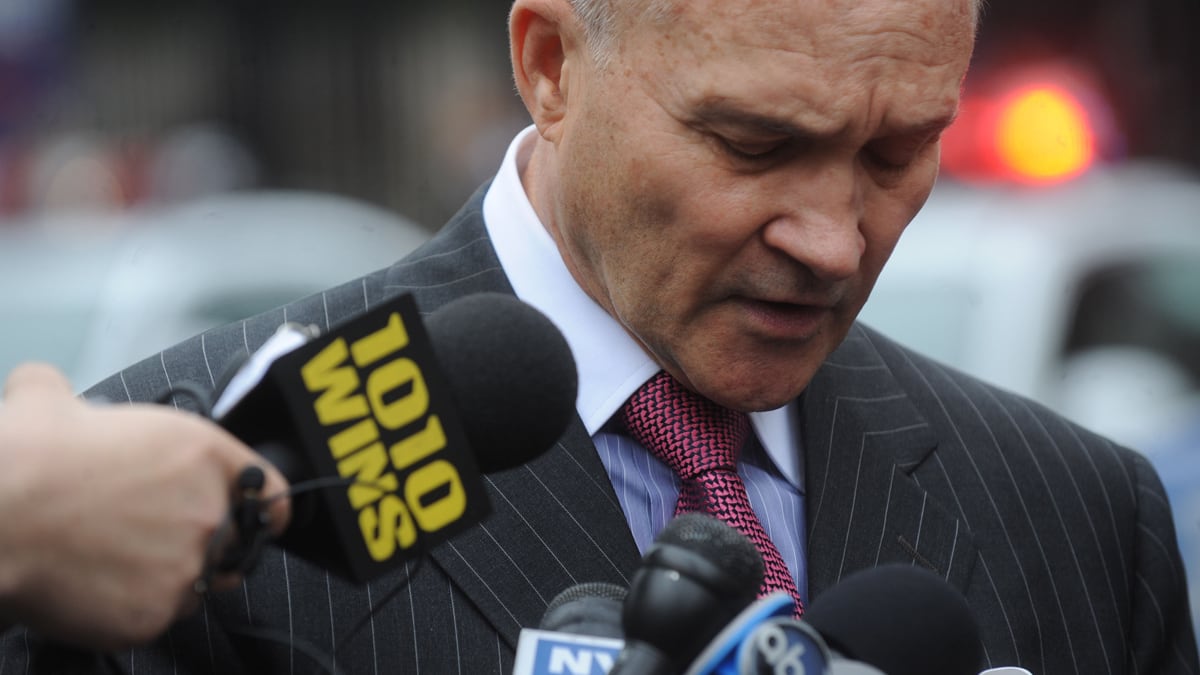A few days before the 10th anniversary of 9/11, Ray Kelly, the face of the NYPD, especially the jaw, turned 70 years old. In his second tour of duty as police commissioner, a year and a half under Mayor David Dinkins in the '90s and nine under Mike Bloomberg, Kelly still polls at the top of the field for the 2013 mayoral election. He is as close to a god in a city where heroes become villains in the flick of a flashbulb as any public figure in my 40 years of covering New York has been.
He is mostly revered because he is not Rudy Giuliani. Though he and Rudy graduated just a couple of years apart from the same Catholic college, and though both have laid claim to dramatic declines in the city’s crime rate, Giuliani polarized the city Kelly has calmed. Kelly’s father was a milkman; Giuliani’s did time in Sing Sing for the armed robbery of one. Giuliani was determined to prove how tough he was by scapegoating blacks. Ex-marine, former Vietnam vet, 40-year veteran of the force, Kelly is, even now in the midst of all the controversies swirling around the NYPD, overseeing administrative proceedings against the acquitted cops that fired many of the 50 bullets that killed unarmed Sean Bell outside a strip club in 2006. He appears to be after their badges for the sake of the badge.
But there is now such an avalanche of scandal descending on the NYPD that even Kelly is threatened by it, depicted in a front-page New York Times story last week, and editorial this week, as an institutional captive of the department unable to independently investigate all the terrible things its members do. That recent list includes allegations, some already proven, of drug-planting, ticket-fixing, Muslim-spying, gunrunning, pepper-spraying, and “frying another n***r,” with the Times insisting that many of these revelations were uncovered by everyone but Kelly’s Internal Affairs Bureau, mostly because it’s too internal. In fact, the one scam IAB did help probe, the indictment of 16 cops for killing parking tickets and other favors, was compromised by an IAB lieutenant heard on one tape tipping off the perpetrators.

The mounting criticism of Kelly is fair and unfair at the same time. The real question is not whether a commissioner in charge this long should be able to control the demons inside the department. The question is: can anyone? Is the NYPD a force unto itself, untamable, as dark sometimes as the streets it patrols? Could anyone do a better job of containing these excesses and outrages than Kelly has?
The power in the department, surviving mayors and commissioners as if they were transients, are the unions that represent everyone in it except the top brass—starting with the PBA (Patrolmen’s Benevolent Association) and including similar unions for sergeants, detectives, lieutenants, and captains. PBA President Pat Lynch, fresh from an uncontested reelection, said this when the ticket-fixing charges were announced a few days ago: “Taking care of your family, taking care of your friends, taking care of those that support New York City police officers is not a crime.” In fact, the accused include many PBA officials, and the union launched a mob takeover of the Bronx courthouse where the arraignments occurred.
What goes largely unnoticed is that some of the charged officers in this and countless other cases are represented by PBA attorneys whose fees are paid by none other than the City of New York. That’s a consequence of collective bargaining agreements with the PBA going back decades that are negotiated by mayors, not police commissioners. The Legal Services Fund of the PBA, which is 100 percent subsidized by regular, per-member payments from the city, “provides job-related legal and civil legal representation to active police officers” for any case “arising out of activities in the scope of their employment as a police officer,” according to its website. That includes “defense of criminal charges,” disciplinary proceedings, administrative law matters, Civilian Complaint Review Board cases, and even criminal investigations preceding indictment. While the city union is hardly the only one that provides such services, the PBA’s blanket of protection covers more forms of alleged misconduct, and at greater cost, than virtually any other paramilitary organization in America. It’s the blue wall of subsidized silence, guaranteeing cops that they will not have to spend a dime in their own defense so long as they remain team players. How does a police commissioner discipline a force with that multimillion-dollar reservoir of resistance?
Go on the website of Worth, Longworth & London, which is representing at least 11 of the 16 officers charged in the ticket-fixing case. It says the firm was “formed in 1998 for the express purpose of providing legal services to its original and still primary client, the New York City Patrolmen’s Benevolent Association,” and that its “entire focus is … minimizing the impact” on the careers and financial assets of police officers “when a complaint is lodged against them or they are accused of a crime.” When Patrick Pogan was convicted of a felony false statement in a report he filed after he attacked a Critical Mass bicyclist, unveiled in a viral YouTube video that showed him initiating combat with the kid, he thanked the PBA and one of the Worth partners who represented him, Stuart London, for keeping him out of jail. Lynch had this to say: “The anarchists were looking for a confrontation with police and found it in a rookie officer trying to do his job the best way he knew how. New York City has one less police officer today who could have served the city well.”
As critical as some of the press coverage has been about IAB, Lynch issued a statement a couple of weeks ago saying that “morale is as bad as I’ve ever seen it” and warning that it wouldn’t improve until “management gets IAB off the backs of police officers who are just trying to do their jobs.” Lynch and the boys think Kelly and IAB are too aggressive.
It is not excusing Kelly—whose job it is to prove that the department is governable—to suggest that we all look at the true dimensions of the challenge, and that we compare him realistically with the captains who’ve steered this ship before him, not against some abstract gold standard. He may be uniquely qualified to tell his city what it must do to attack the culture he has tried, fitfully perhaps, to change—going beyond the "few bad apples" basket of bromides. It’s time for a truthteller to blow a loud whistle on the structure of cover-up, the incest inside this department that is at the center of a great city’s life.
Research assistance was provided by Emily Atkin, Matthew DeLuca, Kelly Knaub, Fausto Giovanny Pinto, and Andy Ross.





